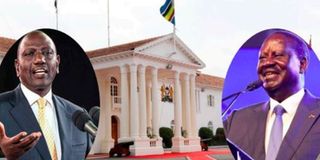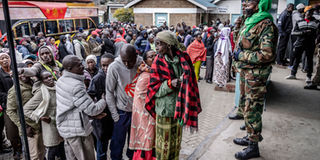Prime
Questions and challenges that Kenya’s election has thrown at Uganda

Deputy President William Ruto and Kenya Kwanza presidential candidate (left) and his Azimio la Umoja counterpart Raila Odinga. PHOTO/NATION MEDIA GROUP
What you need to know:
- Kenyans chose the path of legal electoral reforms aimed at averting recurrences of violence and building public confidence in the electoral processes. Uganda has on the other hand never been able to move towards implementing reforms, Isaac Mufumba writes.
The East African Community Observer Mission has lavished praise on the Independent Electoral and Boundaries Commission (IEBC) of Kenya for carrying out a smooth exercise on Tuesday.
It is hard to tell whether the country will once again erupt into an orgy of violence akin to what was witnessed following the highly contested 2007 presidential elections that resulted in the death of 1,100 people and the displacement of more than 600,000 people.
Following the elections this week, Kenya has generally been calm. This has been unusual for a country where violence has been a mainstay of almost every election cycle that has been held since 1990 when it adopted multiparty democracy.
How has a country, whose politicians are prone to invoking ethnic lines been, able to pull off that feat?
Kenya replicated in Uganda?
Would President Museveni ever wake up one day and campaign for Opposition leader Kizza Besigye to succeed him in a race where say Vice President Jessica Alupo were a candidate as outgoing president Uhuru Kenyatta did for the man who had been his fiercest rival and critic?
Can an election here run as smoothly as it did across the border in Kenya?
Prof Paul Wangoola, a former member of the National Consultative Council, which served as Uganda’s Parliament under presidents Yusuf Lule and Godfrey Binaisa, believes that it is practically impossible for Ugandans to witness that, at least not under the ruling National Resistance Movement (NRM).
“It is not possible for Mr Museveni to preside over such a transition. Those who cause mayhem cannot be the same people to preside over a peaceful transition. They introduced commercialisation and militarisation of the politics. They benefit from it,” Prof Wangoola says.
Kenya’s deliberate efforts
Kenyans chose the path of legal electoral reforms aimed at averting recurrences of election violence and building public confidence in the electoral processes.
Writing for the African Center for Strategic Studies, Mr Godfrey Musila noted that the starting point was soul-searching by all.
“The soul-searching triggered by the 2007/2008 experience galvanised a lengthy constitutional review process that culminated in Kenya’s widely heralded 2010 Constitution,” Mr Musila wrote.
The constitutional amendments resulted in the establishment of a two-tier government, with 47 county governments alongside the national government, devolution of economic and decision-making powers to elected governors, introduction of a presidential system with closely circumscribed powers checked by both the judiciary and a bicameral parliament consisting of a strong National Assembly and a Senate.
Other reforms included strengthening of the judiciary and handing the Supreme Court power to determine presidential elections’ petitions and addressed the question of discrepancies that existed in representation by redrawing electoral boundaries and applying a formula to determine the size of each constituency.
Independence of EC
Kenya, unlike Uganda, has been working to give its electoral processes credibility and legitimacy.

A group of voters wait to cast their vote at a polling station in Nairobi during Kenya’s general election on Tuesday. PHOTO / AFP
The Kenyan National Accord and Reconciliation Act, which was signed in February 2008 as part of efforts to end election violence, led to constitutional and institutional reforms, including a review of the Independent Review Committee (IREC) of the composition and operations of the Electoral Commission of Kenya (ECK).
That review concluded that the voter register was “materially defective” which impaired the integrity of elections.
It was as a result of that review that ECK was disbanded and replaced with the Interim Independent Electoral Commission (IIEC), which organised the August 4, 2010, constitutional referendum. The IIEC’s tenure ended three months after the new constitution came into force. It was succeeded by the Independent Electoral Boundaries Commission (IEBC).
Naming EC commissioners
Under the IEBC Act, the president is required within 14 days of a vacancy arising in the commission to appoint a selection panel comprising a chairperson and eight members drawn from distinguished professionals in the private sector or public service with relevant expertise.
The panel is required within seven days of its convening to invite applications and publish the names of all applicants. It then shortlists and conducts interview.
The panel then selects three persons qualified to be appointed as chairperson and 13 persons qualified to be appointed as members of the commission and forwards them to the president whose selection must be approved by parliament.
Uganda has on the other never been able to move towards implementing reforms that would enhance the credibility of its own electoral processes.
A proposal to amend the manner in which the Electoral Commission (EC) is constituted has been a constant in all sets of reforms proposed by Opposition and the different teams that observed the 2001, 2006, 2011 and 2016 general elections.
There have been calls for the process to be made more competitive and participatory because EC is looked at as an appendage of NRM, which will always cast doubts over the credibility of elections that it organises.
Forum for Democratic Change (FDC) president Patrick Amuriat claims that although his party is aware that EC sometimes declares losers winners in total disregard of the will of the people, they still participate in elections because they stand to win in other ways.
“Where we win, it is big dividend for us. Where we lose, we still gain something out of that participation. When we participate we embolden and conscientise our people. It is good for encouraging our party members who will have lost steam and it is good for the politics of the country,” Mr Amuriat says.
Prof Wangoola says it would be asking for too much for NRM to work democratically.
Pending reforms
The list of pending reforms is quite long. It includes, among others, waiving of the requirement for civil servants to resign before nominations, scrapping elections for special interest groups, introduction of five-year bans from elective politics for those found guilty of offences such as bribery and introduction of proportional representation.
In March 2016, the Supreme Court justices who presided over the election petition that Mr Amama Mbabazi filed challenging Mr Museveni’s election victory ordered government to carry out reforms including, among others, extending the period of filing and determination of presidential election petitions to 60 days.
The judges argued that this would enable both the courts and concerned parties to adequately prepare and present their cases. The judges also wanted media houses that do not grant equal airtime to presidential candidates to be penalised.
Court directed that the reforms be carried out within two years of the ruling to avoid hastily enacted legislation, but government has never complied.
Right from the time the 10th Parliament commenced business, then Speaker Rebecca Kadaga kept calling for the introduction by government of major electoral reforms, but it was not until July 2019 that government tabled the Presidential Elections (Amendment) Bill No.17, 2019, and the Parliamentary Elections (Amendment) Bill No.18, 2019.
Long standing proposals on reforms, including those that had been directed by the court, were, however, conspicuously missing.
From the foregoing, it would appear that NRM does not have the will to carry out any major reforms that would wash the mess off the electoral processes.
Mr Emmanuel Dombo, the director for communications of the ruling NRM, insists that the party has the will to do so. He, however, hastens to add that this will begin with the various actors on the political scene.

National Unity Platform presidential candidate Robert Kyagulanyi is blocked by security personnel on his way to Kasese Town during last years campaigns. Photo / FILE
“The reforms in Kenya started in the hearts of the players. In Uganda, we also need internal soul-searching of the players and the people to be prepared to talk to one another. However transformative the reforms that you put in the law, as long as the hearts of the players have not reformed then we cannot get the desired progress,” Mr Dombo argues.
The problem is that it was NRM that shot down the February 2018 attempt by the Great Lakes Institute for Strategic Studies (GLISS), the Inter-Religious Council of Uganda (IRCU) and the Elders Forum (TEFU) to organise a national dialogue through which Ugandans could chart out ways of solving some of the country’s most contentious political, social and economic issues.
Dr Besigye too had been calling for a national dialogue involving all stakeholders, an idea that government did not warm up to, but Mr Dombo blamed this on Dr Besigye.
“NRM did not dis the idea, but the conditions that Dr Besigye set. Read the proposals by Besigye and see whether in Kenya that is what they did. Did Raila [Odinga] ask for a neutral ground? Did he ask for an independent mediator?” Mr Dombo argues.
The challenge is that even where NRM has appeared to be amiable to dialogue, it fails to implement the things that it agrees on.
For example, members of the Summit of the Inter-Party Organisation for Dialogue (IPOD) proposed in May 2019 amendments to the Public Order Management Act (POMA).
Some of those recommendations included decentralising the powers of the Inspector General of Police and a host of other changes, which were never implemented.
Prof Sabiiti Makara, a Political Science lecturer at Makerere University, has previously argued that that should come as no surprise because NRM does not have a record of implementing reforms that do not suit it.
“Mr Museveni met with his fellow principles in the Inter-Political Organisations for Dialogue and they had a few recommendations made in regard to amendments to the Public Order Management Act, but they were not implemented. I don’t think they can implement any meaningful reforms,” Prof Makara says.
Retrogression?
The biggest fear now is that the country is retrogressing as a democracy.
Commentaries that greeted EC’s recent declaration of NRM’s Herbert Edmund Ariko, winner of the Soroti East parliamentary by-election with 9,407 votes against the 8,771 votes of Mr Moses Attan of FDC, questioned whether EC can ever get it right when it comes to organising elections, which became pertinent given our history.
In the run up to the 1980 election, Mr Museveni of the Uganda Patriotic Movement (UPM) declared that he would go to the bush if the elections were rigged. He made good on his promise and shot his way to power in 1986.
Item Number 1 on the NRM’s 10-Point Programme was a promise to restore democracy through regular elections that would be “free of corruption and manipulation of the population”.
One would, therefore, have expected that all elections under NRM would have been not only corruption-free, but conducted in a manner that would make every process better than the previous one. But that has not happened.
Sections in Opposition had previously believed that it would be in better stead to romp to victory in parliamentary by-elections as it would be easier to join forces to campaign and protect the vote as was the case in Jinja, Rukungiri, Bugiri and Arua.
That pattern had been expected to continue by-elections in Kayunga, Omoro and Soroti, but the NRM won even if it did not matter that it won amid cries of foul play over voter bribery, ballot staffing and arrest of opponent agents, all of which suggest that we are far from realising the NRM dream of an election that is “free of corruption and manipulation”.




